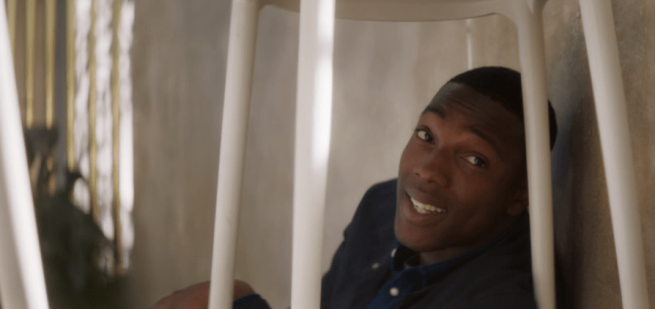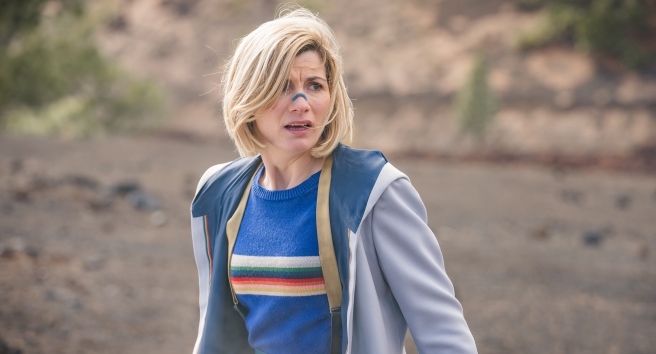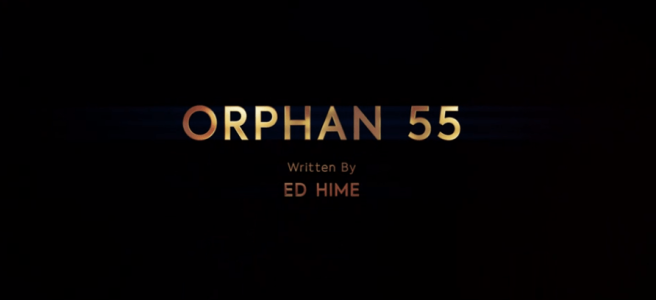The people who used to have this planet could’ve changed, but they didn’t. So they lost everything.
I’m conscious, sometimes, that these reviews trend negative. I don’t entirely enjoy Chibnall’s Doctor Who, after all; it frustrates me deeply, and it’s often difficult to appreciate these episodes without caveats. I’m inclined to think my criticisms of this era are basically defensible – although, you know, I would – and I like to think I’m approaching it with the same consistency and the same critical eye as I do anything else.
Still, though, criticising a Jodie Whittaker-fronted episode of Doctor Who feels oddly like a statement, frankly more than it should. At a certain point, I worry that it gets a little #NotMyDoctor – there’s something that feels a tad odd about critiquing a work who’s most vocal and vociferous critics are, more often than not, the worst kind of people. I’m coming at it from an entirely different angle, of course, but there’s a sense still that I’m joining the same chorus of voices – and that isn’t something I’m entirely comfortable with, even as I’m convinced this Doctor Who deserves critique. There’s a point, I’ve often thought, where I’ll simply stop writing about Doctor Who entirely if it doesn’t improve, because I just really don’t want to seem like one of those people. (Which would be a little sad, I guess, for me if not anyone else.)
So! Let’s take a moment instead to just dwell on something – or someone – in this episode I thought was genuinely quite brilliant: Tosin Cole.
Ryan is an odd character, I think. There’s a version of this all where he’s much more explicitly the ‘main’ character – where The Woman Who Fell to Earth was called Ryan, where he was the character reunited with Grace in It Takes You Away, our viewpoint in all this, that sort of thing. Technically, yes, he is the main companion – but because Bradley Walsh plays Graham, and Bradley Walsh is a brand unto himself in a way another actor wouldn’t be, Graham exerts a lot of narrative gravity that Ryan would otherwise hold. Granted, it’s something all the companions have been victims of, and Ryan has certainly fared better than Yaz… but I’m still struggling to think of, say, big scenes he’s shared with the Doctor individually. What should arguably be the core relationship of the show is quite underdeveloped.
Still, though, when the character works, and I do think he often does, it’s down to Tosin Cole’s performance. What he’s especially good at – here and elsewhere, most memorably Arachnids in the UK – is little background details, broad physical comedy at the edges of the screen. It’s a genuinely emotive – genuinely funny – performance from Cole, the type he’s not had a chance to offer in quite some time. There’s a version of Ryan here I hope we get to see more often: there’s a case to be made, I think, that Orphan 55 is the character’s best episode yet.

It helps, of course, that Cole gets some great material here too – Ryan’s often quite cute interactions with Bella in particular. There’s a bit more personality to it for a change, and Cole has obvious chemistry with Gia Ré. (More than he seems to have had with Gill, anyway, although given quite how slowly the inevitable Ryan/Yaz romantic pairing is being introduced, perhaps the chemistry is still yet to come.)
Unfortunately, though, it’s difficult to say this for the rest of this week’s guest cast. It felt like Voyage of the Damned by way of The Infinite Quest – constantly moving forward, constantly reinventing itself (the reveal that Bella is Kane’s daughter comes almost exactly five minutes after Bella first mentions her mother), but lacking any space to breathe. None of these character moments work, because, well, of course they don’t – it’s much, much too busy.
Orphan 55 has momentum, yes, but that momentum is built at the expense of clarity. There are quite a few wrinkles I wish were better explained – how conscious are the dregs, how intelligent are they? Did they torture Benni, imitate his voice, or did he mutate into one of them? Whichever it was, I suspect it changed between scripting, filming, editing and transmission. Are the dregs the villains or the victims of the piece? After all, they’re presumably the descendants of the people who weren’t rich enough to escape the Earth. (This raises another interesting question, though – if those aren’t first-hand memories of the apocalypse, then it’s information that has been conveyed to the dreg – which suggest intelligence, society, some sort of recorded history?)
If Kane is terraforming Earth, isn’t that a good thing? Orphan 55 touches on some interesting ideas about colonialism and capitalism, both of which are easy to tie to environmentalism; when the tourism resort is revealed as a front to fund the terraforming project, it could be read as a satirical swipe at how environmentalism flounders under profit incentives. Except, well, why is the resort a bad thing if they’re terraforming Earth – essentially a sci-fi version of cleaning up the environment, undoing the damage wrought before? The thinly sketched personal motives to Kane/Name’s conflict seems to be the reason why the resort is bad – but then, isn’t “I was only doing it for her” less about flogging real estate, but restoring a home, a sort of environmental stewardship?
It harms the episode, in the end, and it’s difficult not to think that at some point there should’ve been more substantial rewrites. I wonder, idly, if this is an Ed Hime problem more broadly – It Takes You Away wasn’t quite so overstuffed, but it had a whole set piece removed in the middle. That episode might’ve felt a lot more like this one if it weren’t for those edits, perhaps.

More likely than not, this episode will be remembered for its ending. An ending which, interestingly, was specifically hyped up by BBC America – “you don’t want to miss this ending”, both inviting the question “which ending do we want to miss” and ultimately proving more than a little anticlimactic.
I didn’t love it, personally. Setting Orphan 55 on Earth is a clever conceit – sure, the time travel makes no sense, and I think technically the TARDIS should translate the Russian, but who cares, it’s largely a good enough idea to be worth doing anyway. Certainly, it’s more resonant than it ever would’ve been if it was a colony on the planet Zog. The episode’s heart is clearly in the right place, and that’s more than can be said of most of the Chibnall era, right?
Well, yes. And yet… it made me bristle. I mean, I’m speaking as someone who wants Doctor Who to be more openly political, who wants it to be more openly lefty, who’s been critical of Chibnall Who’s more reactionary impulses. This, though, felt too didactic – the Doctor openly moralising to the camera. Which, well, in theory I’m not even against necessarily, I’m sure there’s ways to do it well, but here it felt tepid and flat. In the end, I don’t know that it actually meant anything. Which, well, is the problem with a lot of this episode – it moves so quickly it can only really gesture at ideas (like the “listen to the youth” angle, with the vaguely Greta Thunberg-esque child mechanic) without ever really exploring them properly.
I said on twitter a few times that this lacks subtlety (I’d argue it’s less subtle than Aliens of London and Ker-blam!), but that’s not the problem, in fact. It lacks grace – it’s just clumsy, and not even especially incisive. A nebulous, “you can still do better” would’ve been fine a decade ago, but it’s not enough now. Indeed, perhaps the most damning thing you can say about Orphan 55 is the fact that Primeval, of all things, was more coherent and more condemning in its environmental messaging back in 2009. Good message and all – a little meaningless, but good. Doesn’t change the fact it’s pretty poorly written though.
Tell you what, though, it might not even matter anyway. In one of my favourite bits of Doctor Who writing, and I think the one that’s stuck with me most, a left-wing journalist interviews a right-wing politician about their shared love of Doctor Who – because this journalist was absolutely baffled by the fact that this politician found anything to enjoy in Doctor Who at all.
They talk about a few things – the politician, George Christensen, opposes same-sex marriage, opposes abortion, supports Donald Trump – but the bit I always remember is when they’re talking about global warming. Christensen doesn’t believe in global warming, but cited that as something the Doctor agreed with him on, very excitedly referring to a throwaway line of dialogue from The End of the World. “You spend all of your time thinking about dying, like you’re gonna get killed by eggs, or beef, or global warming, or asteroids. But you never take time to imagine the impossible, like maybe you survive.” That was enough for this guy to think Doctor Who’s official stance on the matter, its message insofar as it might have one, was one of climate change denial. Orphan 55 might even have been too subtle for him – no doubt, if he watched it, he happily dismissed global warming as a fate for another timeline.
I suppose in the end I just wish Orphan 55 had had just a little more finesse.
Related:
